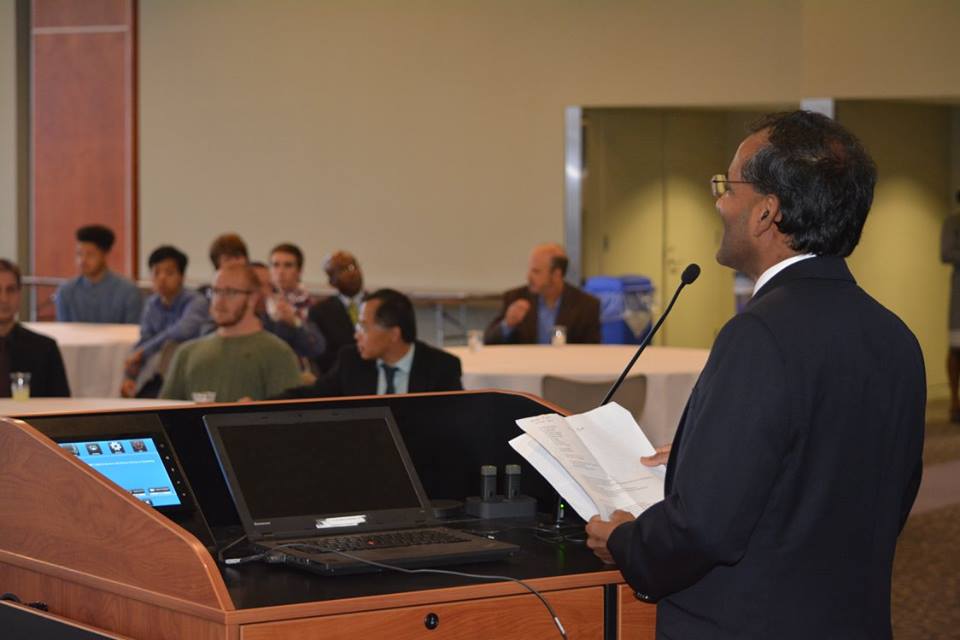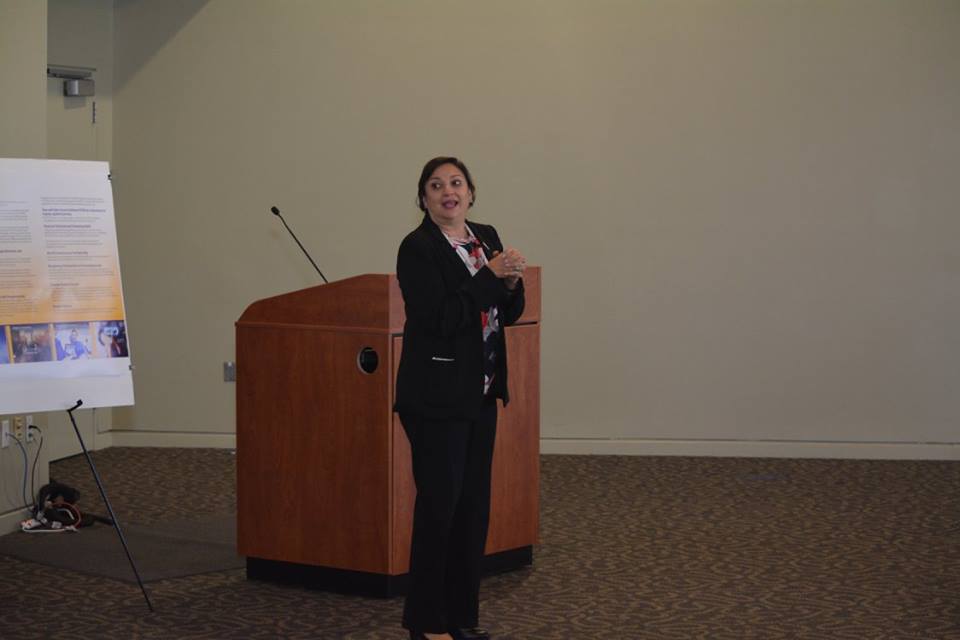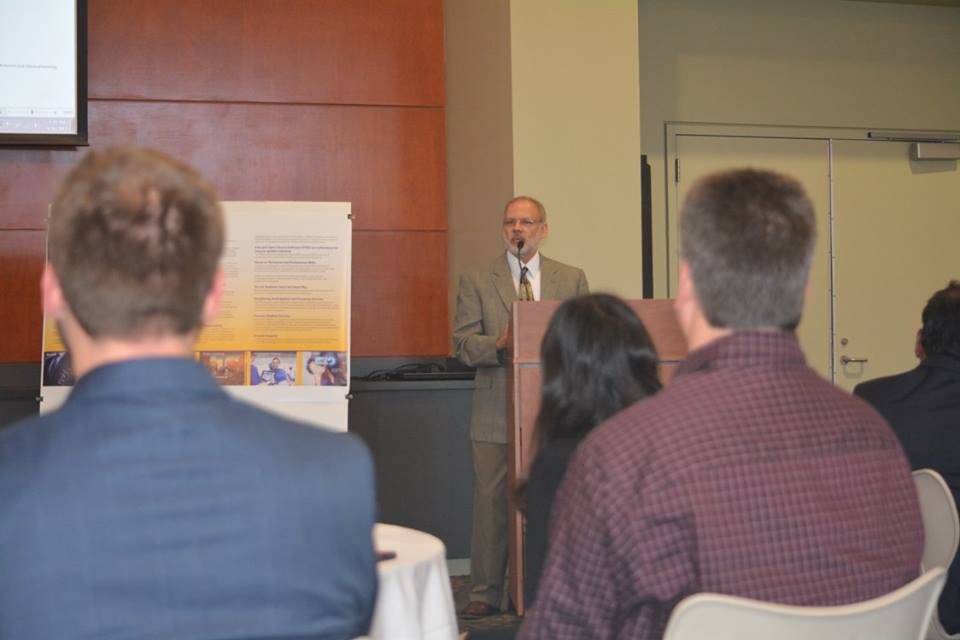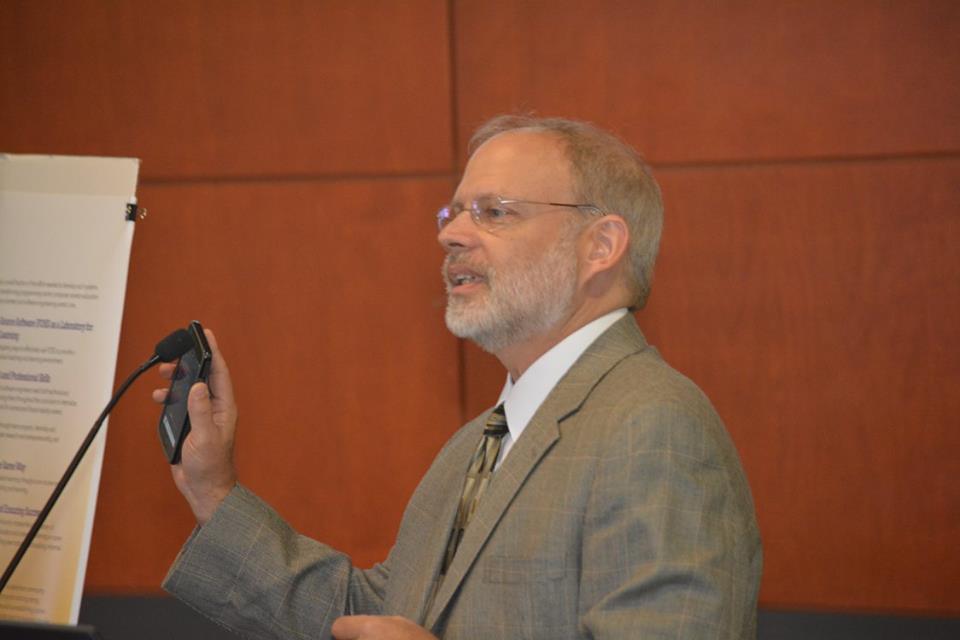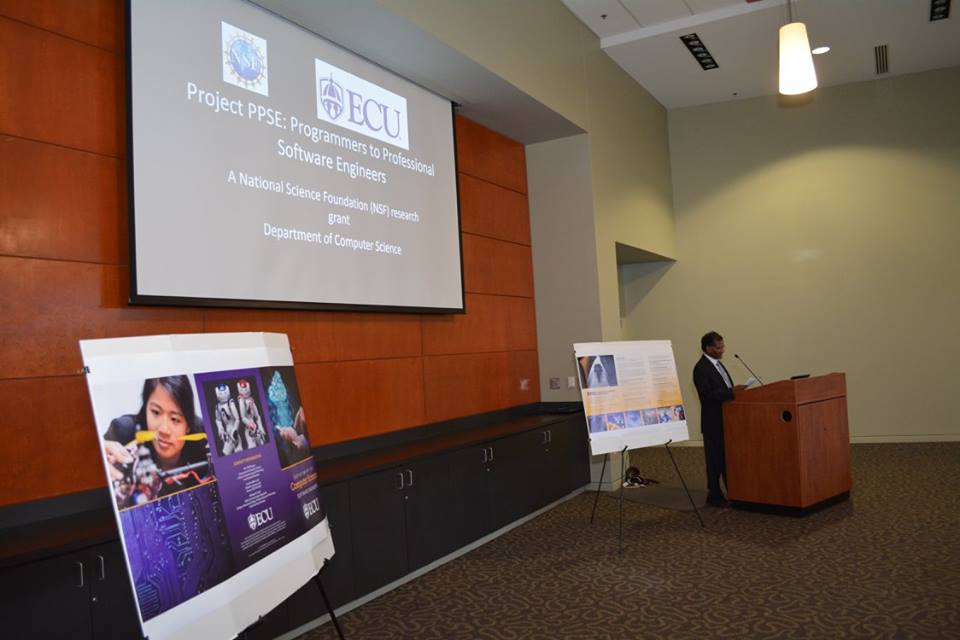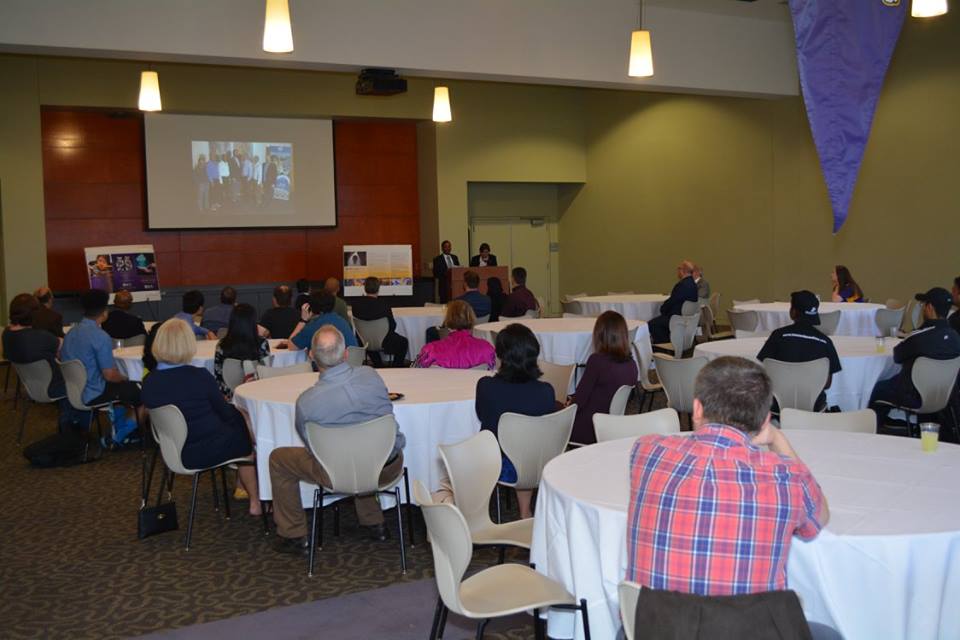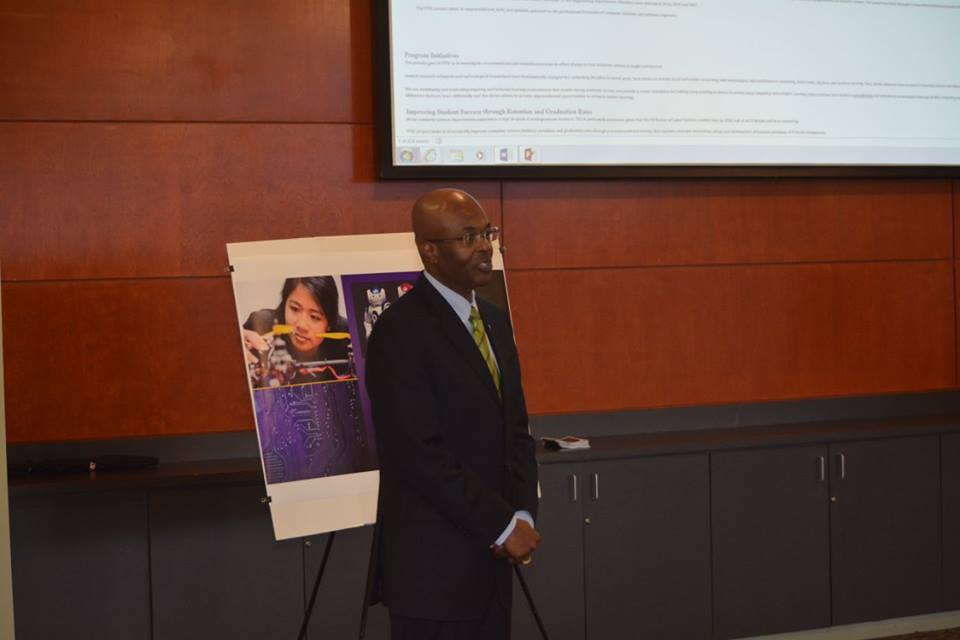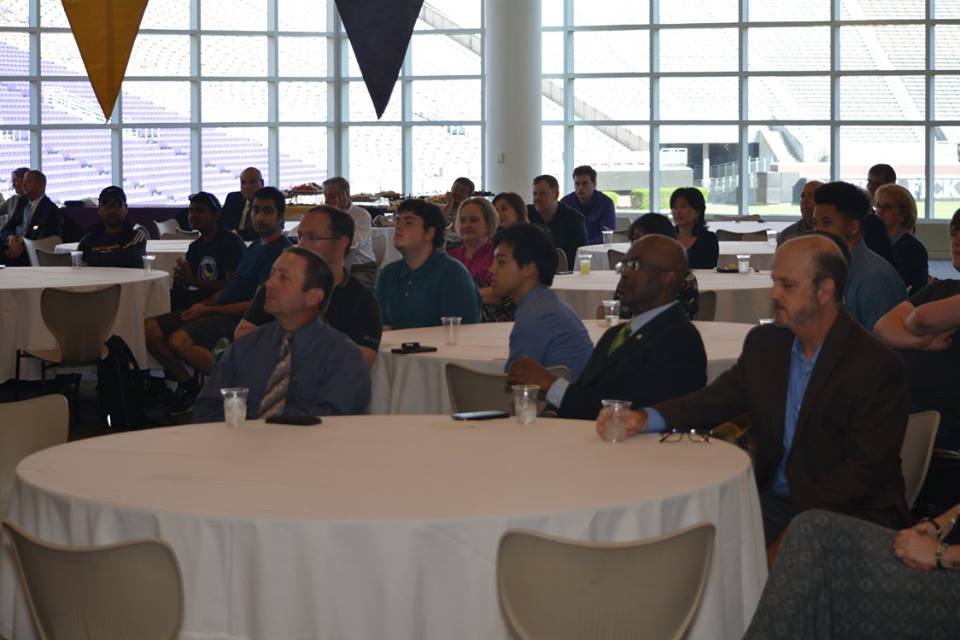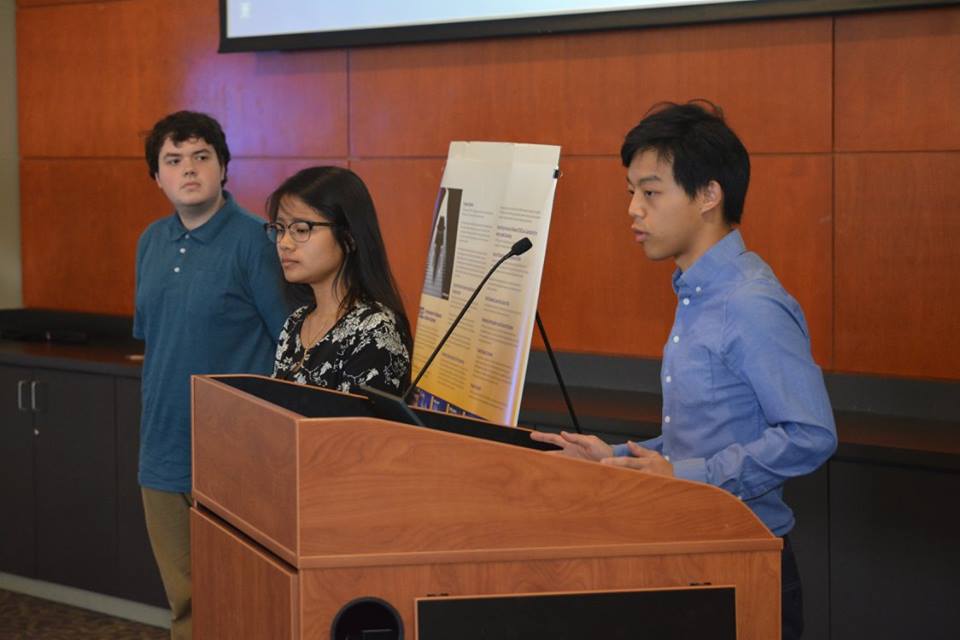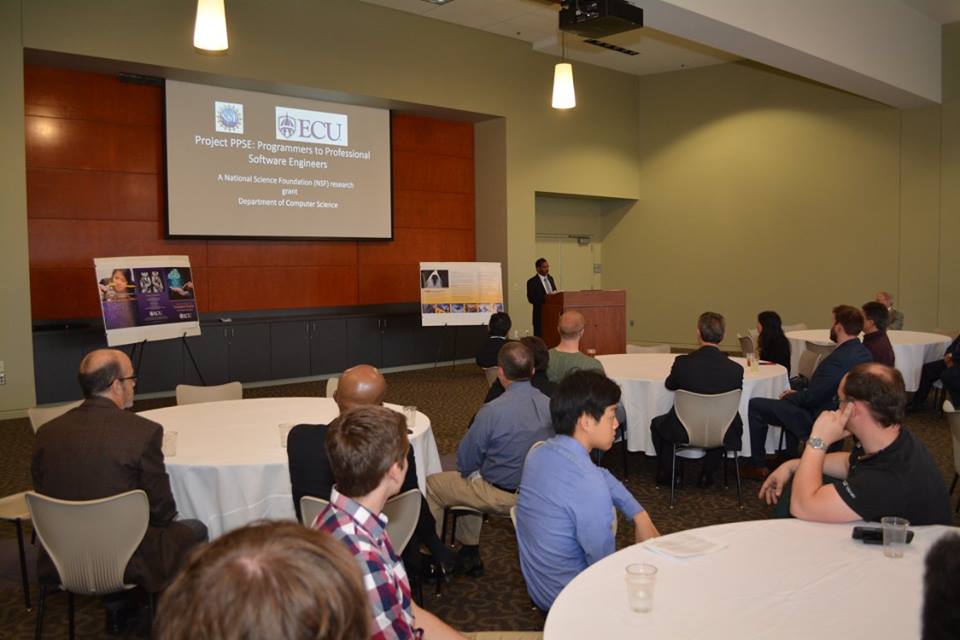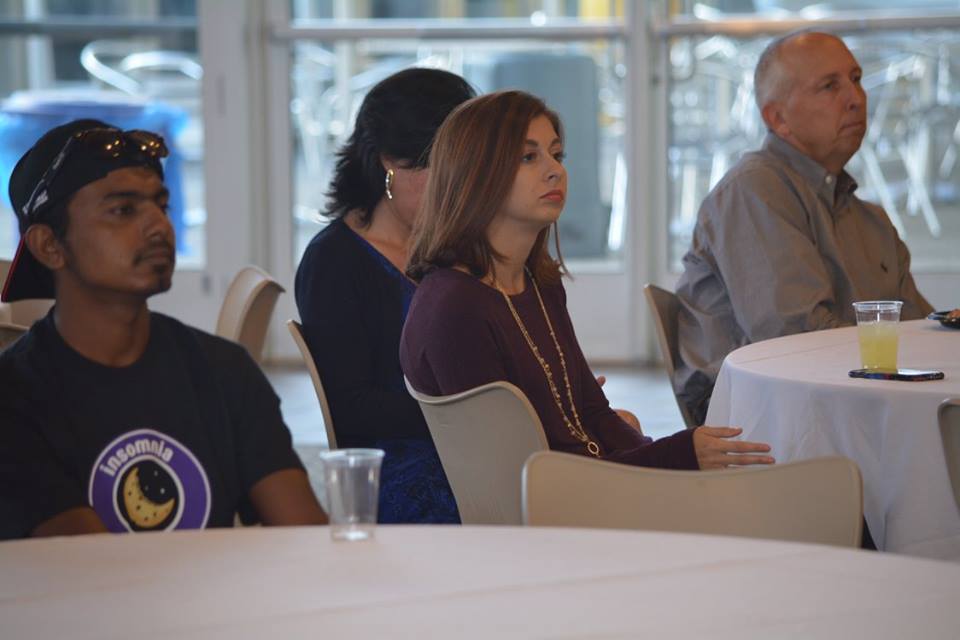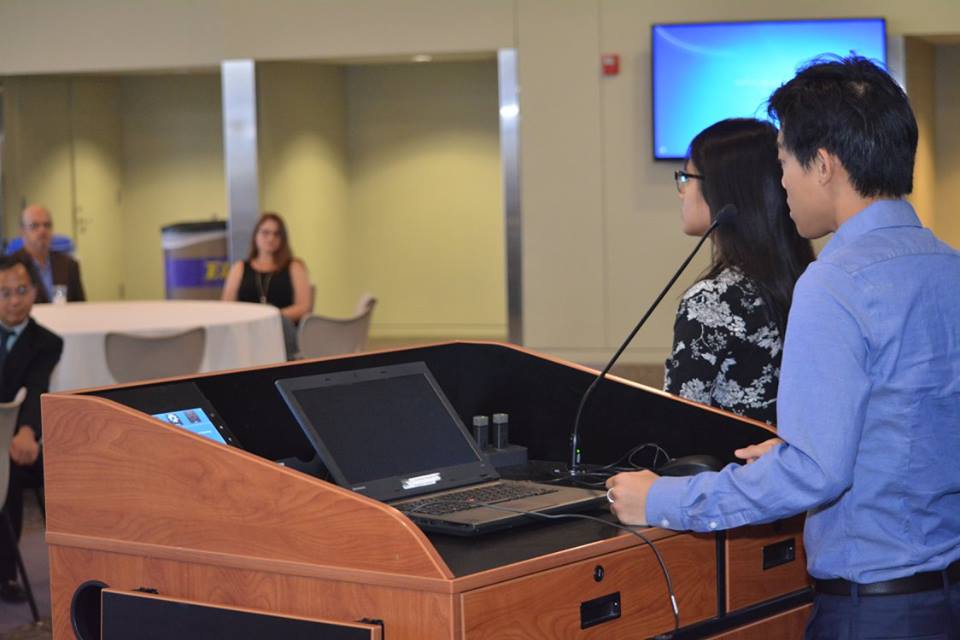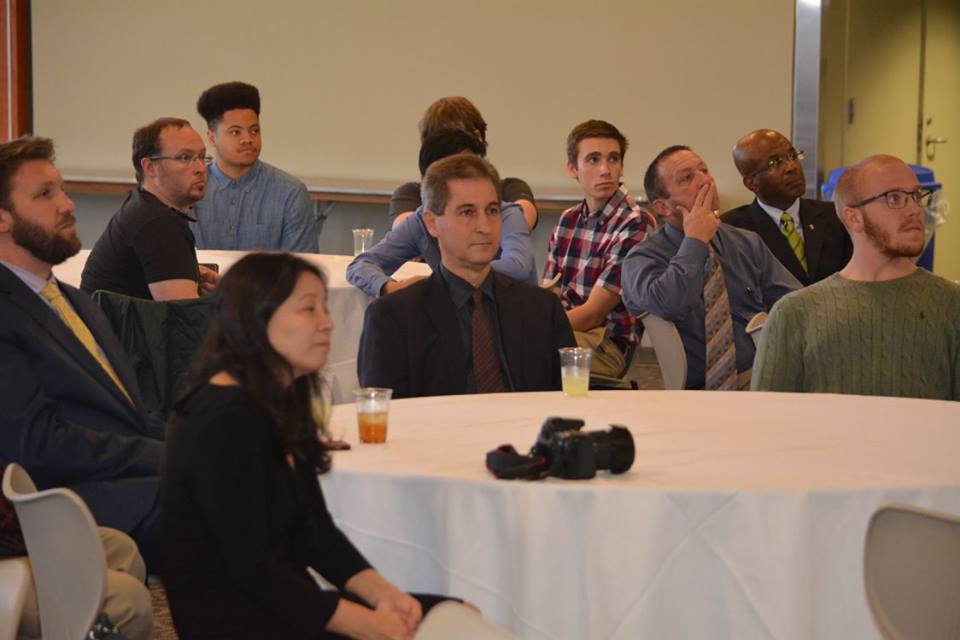The first year of the grant primarily focused reviewing data and help formulate goals to improve Computer Science education. We describe the accomplishments under the following categorization:
- Major activities
- Focus groups
- Kick-off meeting pictures
Major activities
A website dedicated to the project has been developed – https://ppse.ecu.edu
A subset of the ECU RED team participated in the 2017 NSF RED PI meeting, July 10 - 11, 2017, Arlington, Virginia. The team delivered a lightening talk, made a poster presentation, and attended all events of the meeting. Team members who attended the meeting include Venkat Gudivada, Junhua Ding, Mark Hills, Nasseh Tabrizi, William Sugar, and Bryan Hutchins.
The ECU RED team secured a dedicated lab space to conduct project activities. The lab is located in room 232 of the Science and Technology building. Four undergraduate students have been working on the ECU RED project activities since March 2018. This work encompasses the development of teaching and learning materials to implement problem-based learning using open-source software in two senior-level courses: CSCI 4120 - Machine Learning, and CSCI 4130: Information Retrieval.
The RED project kickoff meeting was held on 26 September 2017 at East Carolina University (ECU) campus. This was a high-profile event to publicize the project to university-wide audience as well as industry partners. Over 80 people attended the event, and outside participants included people from Pitt County Early College High School, Pitt Community College, Nvidia, SAS, and IBM.
The ECU RED team met bimonthly and brainstormed ideas and approaches to accomplishing the project goals. Most of the effort was invested into planning for the next four years.
The ECU RED team participated in all the REDPAR monthly calls.
Two project team members – Drs. Mark Hills and Junhua Ding – participated in Professors’ Open Source Software Experience (POSSE 2017) workshop, November 16-18, 2017, Raleigh, North Carolina. The goal of this workshop is to help professors learn about Free and Open Source Software (FOSS) so that they could incorporate FOSS into their courses to enhance student learning. This workshop has three stages of participation: stage 1 includes approximately 20 hours of online (both asynchronous and synchronous) activities; stage 2 includes a 2.5 day face-to-face workshop; and Stage 3 is ongoing participation in a community of faculty members who use FOSS in their classes. Drs. Hills and Ding plan on using FOSS in their courses during the 2018-19 academic year.
Dr. Junhua Ding represented the ECU RED project on a RESPECT 2018 (the third international conference of the IEEE Special Technical Community on Broadening Participation) panel named “Revolutionizing the Culture of Computer Science.” The panel was held on 21 February 2018 and other RED teams on the panel included the University of North Carolina at Charlotte, University of Texas at El Paso, and Boise State University.
The ECU RED project was presented to the ECU CS Department Advisory Board members at the semi-annual meeting held on 14 December 2017. The Advisory Board members were requested to provide guidance to the ECU RED project especially in the areas of courses and curriculum, and infusion of professional skills across the BS in Computer Science curriculum. The ECU RED team also sought comments and feedback on the BS in Software Engineering new degree program courses and curriculum. The ECU RED project progress was also presented to the ECU CS Department Advisory Board members at the semi-annual meeting held on 4 May 2018.
Towards the goal of improving both retention and graduation rates, course syllabi for all BS in Computer Science courses were reviewed and revised. Also, work towards ABET accreditation of the BS in Computer Science program has begun during this reporting period.
The ECU RED project change model is called “Appreciative Inquiry (AI).” Prof. Ron Fry of Case Western Reserve University is one of the originators of the AI change model. Prof. Fry conducted a one-day workshop for the ECU Computer Science faculty on the AI change model on 13 April 2018. Prof. Fry is the change model consultant for the ECU RED project. He will conduct follow up sessions on effecting change in Fall 2018 and beyond.
The ECU RED team succeeded in securing approval for a new degree program – BS in Software Engineering – in June 2018. This new program will enable exploring innovative and inclusive pedagogy, investigation of non-course-centric curriculum, enhancing student learning with open-source software, and infusion of professional skills across the entire curriculum. The team has introduced 13 new courses that will form the core of the new degree program.
Dr. Marjorie Ringler (Social Scientist) and Dr. William Sugar (Education Researcher) conducted an undergraduate student focus group meeting on 15 November 2017. The goals for the focus group is to gather information about a) why students at ECU chose computer science as a major; b) student experiences in their first course(s) of the program; c) student learning styles and learning preferences and; d) why some students leave the computer science program at ECU. The enclosed document has details of this focus group session. Also, Drs. Ringler and Sugar conducted individual interviews with faculty members of the ECU Computer Science department to understand their views on the RED project and how to get them on board with the RED project. These sessions were conducted during spring 2018 semester.
Dr. Brian Hutchins and Dr. Eric Grebing (external evaluators) worked with the ECU RED team to provide feedback and support around first year implementation planning activities. They also designed instruments and collected both qualitative and quantitative data to document implementation of the project and to collect baseline data to support future analysis. The enclosed document provided details of evaluation activities.
ECU Computer Science department became a member of the National Center for Women & Information Technology (NCWIT), which provides resources and best practices to attract underrepresented groups into computing. Qin Ding (a Co-PI) attended the NCWIT summit, 15 - 17 May 2018, to learn about the strategies for recruiting women into computing.
Towards the goal of recruiting more women into computing, the ECU Computer Science department enabled the creation of Women in Computer Science (WiCS) students’ organization. Venkat Gudivada (the PI) served as the inagural faculty mentor to WiCS.
Dr. Mark Hills (a senior personnel) attended the 2018 ACM SIGSCE conference, 21 - 24 February, 2018 to learn about innovative and inclusive pedagogies in Computer Science.
Dr. Junhua Ding (a Co-PI) participated in the BB&T Leadership Fellowship program, which was hosted at ECU in 2017. He introduced sample projects based on the fellowship program into CSCI 4000 course to enhance student leadership capabilities. He also attended the 2017 Google Cloud Platform (GCP) Faculty Education & Training Workshop. He introduced the GCP platform and secured credits for students in two courses: CSCI 4110 - High Performance Computing and CSCI 4520 - Computer Architecture. Dr. Ding also incorporated open-source tools and projects into CSCI 3000 - Operating Systems course.
A subset of the ECU RED team attended the 2018 NSF RED PI meeting, July 10 - 11, 2018, Alexandria, Virginia. The team delivered a lightening talk, made a poster presentation, delivered a PechaKucha presentation at a breakout session on curricular changes, and attended all events of the meeting. Team members who attended the meeting include Drs. Gudivada, Ringler, Hills, Tabrizi, and Sugar.
Focus groups
The project initiated its activities by conducting a focus group with computer science students at East Carolina University (ECU) to gather feedback to help the department of Computer Science improve their academic programs. This focus group was conducted November 15, 2017 from 4 to 5 pm in the Science and Technology Building Room 144A. The purpose of the focus group was to gather information about
- Why students at ECU chose computer science as a major,
- Student experiences in their first course(s) of the program,
- Student learning styles and learning preferences and, and
- Why some students leave the computer science program at ECU?
Methodology
The researchers utilized a focus group, a qualitative method, to obtain data that would describe student experiences in the computer science program. A focus group methodology provided the researchers with means of collecting data that could be used to construct descriptive accounts student experiences in the Computer Science program that could indicate areas of improvement (Creswell & Plano Clark, 2018). The focus group format allowed for the researchers to gather data from a large group of students (n=18) and hear their subjective experiences. The focus group generated large amount of data for each of the focus group questions because students interacted with one another and built on each other’s comments. The researchers probed for details on some comments but for the most part the students were engaged in sharing their perceptions most of the time.
The researchers that conducted the focus group were two faculty from the College of Education. They did not know any of the students and did not teach in the computer science department. This provided additional assurances to the focus group participants that their identities would remain anonymous.
Participants and procedures
A total of eighteen students participated in this focus group. Out of the eighteen students seven were in their senior year, five in their junior year, one in their sophomore year, one in their freshman year, and four whose year was not able to be determined because they arrived after the question about their year was answered by a show of hands. No names were exchanged and no recordings were made to protect the anonymity of all students.
Researchers used an open-ended interview protocol to guide discussions. One of the College of Education Faculty facilitated the focus group questions and the other faculty took notes of the responses. In addition students were given the questions with blank spaces for them to write their responses if they felt they did not want to share out loud or if they wanted to expand on some ideas on this paper. The interview questions were:
- Why did you choose computer science as your major? Think about the introduction course in the program.
- What were some things about this course that were positive and why?
- What are some things about the course that could be improved?
- How do you learn best? Describe your learning style and learning preferences.
- Are you aware of any students that dropped the computer science program? Why do you think they left the program?
Data analysis
Focus group question 1
Why did you choose computer science as your major?
The field notes of the responses for this question went through several phases of analysis (Miles and Huberman, 1994). A preliminary analysis was conducted in order to sort and sift through the responses to identify similar phrases and ideas. The phrases and ideas were then labeled. Several of the labels were collapsed in to broader labels, Creativity/Mental Challenge; Employment; Love Computers and Video Games; and Ranking/Referral/Scholarship; that elaborated a small set of generalizations that covered consistencies in student comments.
| Label | Sample Comments made by students |
|---|---|
| Creativity/Mental Challenge | Creativity of programming – find best way to solve a problem. |
| Analytic thinker and loves computer – extremely detail oriented. | |
| I liked being able to view other subjects such as science in a different, more analytical way after taking programming classes. | |
| My dream job at the time was to develop games and work with computers allows that. Moreover, with such a highly versatile personal projects are limitless. | |
| Employment | Money |
| Job security | |
| Because I enjoy computers and like money and working with computers and making money is nice. | |
| Love Computers and Video Games | When enrolled they had a video game certification and no longer offered. |
| I was interested in video game design and development but also in programming in general. Computer science would give a good background in programming and the certificate gave me partial insight into what game development requires. | |
| Ranking/Referral/Scholarship | Transfered from CC. Took a programming class and teacher there recommended. |
| Tuition is affordable plus living money in Greenville. | |
| ECU ranked #2 in the state 2015 (random boards online). | |
| I tried Khan Academy before applying. They made learning easy and fun. I learned at a very quick rate. |
Focus group question 2
Think about the introduction course in the program.
- What were some things about this course that were positive and why?
- What are some things about the course that could be improved?
The field notes of the responses for this question went through several phases of analysis (Miles and Huberman, 1994). A preliminary analysis was conducted in order to sort and sift through the responses to identify similar topics or ideas. The ideas and topics were categorized by general comments about the first course, comments for program improvements, and comments about classes, course content, and professor teaching styles. For each a list of things that were positive were listed and a list of things that could be improved were also listed.
The main topics raised by students were summarized in the following bullets below (see tables for more detailed comments from focus group discussions):
- Faculty should evaluate the introductory course sequence and select language(s) whose scope and sequence increase incrementally with rigor and challenges
- The variety of background knowledge of new students to the program may warrant the need to incorporate a placement test and a path that helps beginners grow exponentially in their computer knowledge while challenging those that already have computer science background
- Pedagogy may be improved by connecting theory to more practice and hands on experiences in courses and laboratories
- Train tutors and GAs in the course content prior to hiring them for student support and in labs
- Instructors vary greatly in their teaching styles and approaches to helping students. Empathy, support, and caring are valued qualities in professors and there is mention of harsh and intolerant treatment by a professor that may cause problems for student learning.
Focus group question 3
How do you learn best? Describe your learning style and learning preferences.
The field notes of the responses for this question went through several phases of analysis (Miles and Huberman, 1994). A preliminary analysis was conducted in order to sort and sift through the responses to identify similar topics or ideas around student preferred learning preferences. Areas mentioned as not beneficial to their learning were also categorized by similar topics.
Students mentioned that they liked to learn in groups and liked to tackle practical applications of the content being learned. There are instances where some students prefer independent work. Projects and visual examples were mentioned as helpful to understanding the content of their courses. Examples and hands on learning were mentioned as ways that they prefer to learn. Students suggested that the least beneficial approaches included having power points read to them, lectures, and formats that are rigid and discourage creative thinking.
Focus group question 4
Are you aware of any students that dropped the computer science program? Why do you think they left the program?
The focus group comments were categorized by the following topics: student interactions, program of study, prerequisites, faculty, internship or field experiences, labs, and other. The findings are listed as suggestions for program improvements
Student interactions
-
Student interaction is very important – encourage interactive learning experiences
-
The program should increase the opportunities for extracurricular activities
-
Helping other students should be promoted, more group work asking questions, looking at code. Active learning was recommended
Program of study
-
Students asked for more connection between learning and application of learning
-
Make more course available each semester
-
Increase flexibility in required courses and add different professors to lselect from when registering to provide opportunities to learn from various perspectives.
-
Revise the intro class to provide students an overview of what it is to be a computer scientist and what is required to complete this degree
Faculty
-
Not enough teachers to offer courses – course availability is an issue – senior cannot graduate this semester because the one course is offered in the spring – schedule too rigid.
-
Some professors need to improve how they teach by including active learning, connections to practice, empathy,
-
Lecture is main mode of instruction – students do not see value of lectures
Internship/field experiences
-
Would help if internships of co-ops to be used for credit hours
-
Lab and tutoring support could benefit from additional training in CS to help new students
References
-
Creswell, J.W., & Plano Clark, V.L. (2018). Designing and conducting mixed methods research (3rd Ed). Thousand Oaks, CA: Sage Publications.
-
Miles, M.B., & Huberman, A.M. (1994). Qualitative data analysis (2nd ed). Thousand Oaks, CA: Sage Publications.
Kick-off meeting pictures
